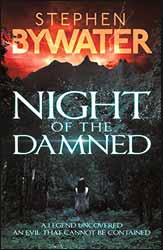|
Click here to return to the main site. Book Review
The commercial requirements of industry and the need for a compliant labour force have led the Carson Company to set up a rubber plant deep in the Amazon jungle, supposedly in an attempt to both increase its profits and bring civilisation to a backwards Brazil. The plantation's lack of success leads the company to send an investigator, Frank Leavis, to look into the disappearances and defections amongst the native workers. When he seems to meet an unfortunate and unexpected death Company agent Miller is dispatched to discover the truth... Night of the Damned (2015. 357) is the second novel from Stephen Bywater, which follows, but is unconnected to his debut novel, The Devil's Ark. Thematically there are a number of similarities between the two novels. Both have obviously been well researched. This latest novel is set in 1935 and perfectly reflects the social moirés which existed, especially the easy and thoughtless racism which the book's Caucasians engage in when discussing the native workers. Even though the American Civil War had brought emancipation, it had obviously made little difference in the American characters point of view, many of whom see the native Indians as little more than sub human. It is ironic then that the novel also contains a character who dreams of making a slave underclass, thoughtlessly compliant to the wishes and needs of modern industry, regardless of colour, death being the great leveller. Sometimes it a real shame what is written on the cover of books. In this case the front is adorned with ‘The dead Awaken when the Living Sleep’ the reverse speaks of rotting flesh and a corpse like girl. This screams zombie novel to most people, which is a real shame as the novel is so much cleverer than this. From the description it’s no great surprise that Miller encounters many strange things, including zombie like creatures, but while the novel discusses the possibility of evil as the motivating source this is never confirmed, rather it is presented as Miller's attempt to understand something completely outside of his experience. The story is predominantly told from Miller's perspective and through his eyes we witness the racist imperialism of the American workers, who supposedly are bringing civilisation to the jungle. The tale of growing madness is not unlike Joseph Conrad’s 1899 novella, Heart of Darkness, which itself was the inspiration for Francis Ford Coppola's 1979 film, Apocalypse Now. All three view the native civilisation, from the European's point of view as, in equal parts inferior and something to fear. Bywater succeeds in slowly layering on the sense of impending doom. People are dying in the camp, others left in a semi catatonic state. Every time Miller seeks an explanation for what he feels is suspicious, he is referred back to the dangers of the jungle. As the audience, like Miller we alternate between feeling that something is very wrong with the camp, only to be pulled a little back by what appears to be reasonable arguments. The truth is further fogged by the fact that Miller has to take medication which might be making him paranoid and cause hallucinations. What is real and what is fevered imagination is often left to the reader’s imagination. You could just read this as a zombie novel, if so, it is a far more superior and literate take on the genre. Below this veneer you will find a rich novel about the changing nature of industry and the requirements it required from its workforce, the horrors of war and the nature of fear. I remember enjoying The Devils Ark for the writing skill and attention to detail and if anything I think Night of the Damned has taken Bywater’s writing to the next level. 8 Charles Packer Buy this item online
|
|---|


